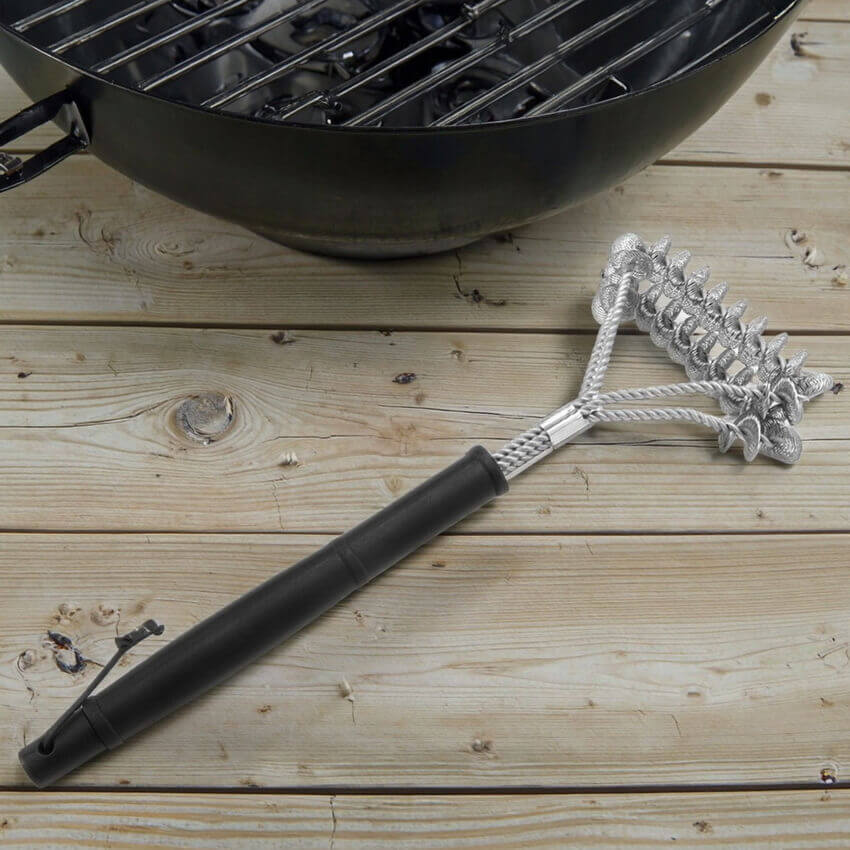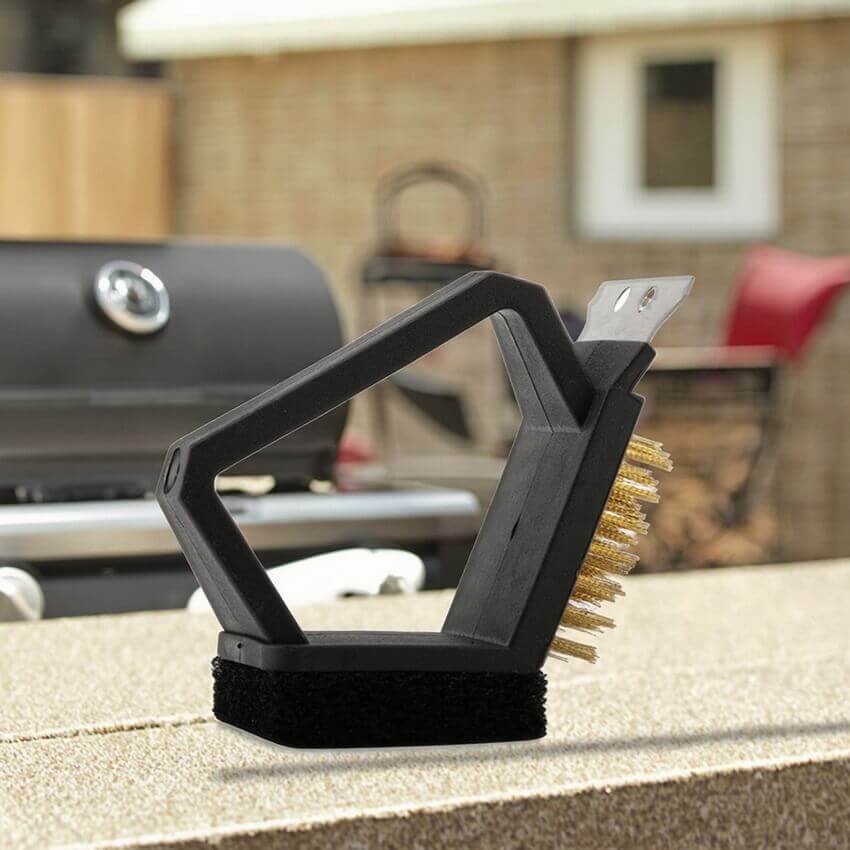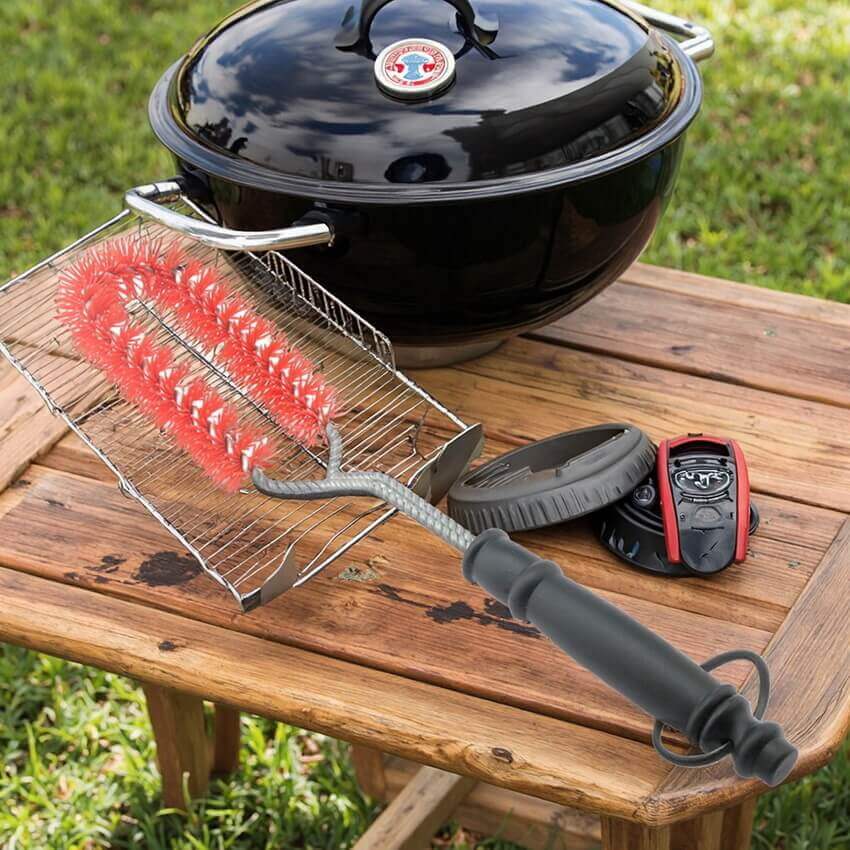![]() Windy.
Windy.
 WeChat
WeChat
 WhatsApp
WhatsApp
Click:138 seen
After each BBQ, the solidified grease and burnt food residues on the grill always cause headaches - if not cleaned thoroughly, not only will there be a burnt smell during the next cooking session, but the remaining grease will also breed bacteria and even corrode the grill components, shortening its lifespan. Choosing the right grill cleaning brush can double the efficiency of this "troublesome task". There are 4 types of grill cleaning brushes on the market, each with its own specific application scenarios. Blending them haphazardly not only results in poor cleaning effects but also may damage the grill.
Steel wire cleaning brush: The "powerful cleaner" for stubborn stains
The brush head of the steel wire cleaning brush is made of high-hardness stainless steel wire, with a diameter typically ranging from 0.1 to 0.2mm. It is highly flexible and wear-resistant, making it the preferred choice for cleaning thick burnt residues. It is especially suitable for cast iron grills in charcoal grilling and large gas grills - these grills often have meat cooked at high temperatures, and the grease dripping onto the grates quickly solidifies, forming firmly adhered burnt chunks. It is recommended to heat the grill for 10 minutes before use: the high temperature can soften the burnt residues, and then wipe the burnt chunks along the grill pattern in a longitudinal direction. The chunks will fall off along the pattern, which is 60% more labor-saving than cleaning at room temperature. However, be careful not to use the steel wire brush on non-stick coated grills (such as ceramic coating trays on electric grills) or glass covers - the sharp steel wire will scrape off scratches, damaging the coating and making the subsequent cleaning more difficult. In addition, after each use, the brush head must be rinsed immediately, dried, and stored to prevent the steel wire from getting damp and rusting. Rusty steel wire may leave rust marks during cleaning, contaminating the grill.

Copper wire cleaning brush: The "gentle steward" for stainless steel grates
Compared to the steel wire brush, the brush head of the copper wire brush is softer - the copper wire has a hardness of approximately 1/3 that of steel, with a smooth surface without sharp edges, suitable for cleaning light stains on stainless steel grates, such as 304 stainless steel grates on household gas grills or detachable racks on small electric grills. After cooking vegetables or seafood, there is only a thin layer of oil and fine debris on the grill. Using a copper wire brush to gently wipe can clean it thoroughly, without scratching the oxide layer on the stainless steel surface, and can deeply clean the gaps in the grill, removing the food debris hidden in the gaps. However, the cleaning power of the copper wire brush is limited. If there is thick grease that has not been cleaned for more than a week, a neutral cleaner should be used: spray the cleaner on the grill and let it stand for 5 minutes, then wipe with the copper wire brush, and the grease can be easily removed. There are also specific maintenance rules: after each use, the brush head must be rinsed with warm water, dried, and coated with a thin layer of edible oil on the copper wire surface to prevent oxidation and blackening, and to extend the lifespan.

Nylon cleaning brush: The "exclusive guardian" for delicate grills
For "delicate" devices such as electric grills, non-stick coated grills, and ceramic grills, nylon cleaning brushes are the best choice. Its brush head is made of high-temperature-resistant nylon (with a maximum temperature of up to 120℃), soft and elastic, allowing it to adhere to the grill surface during cleaning, without scratching the non-stick coating or wearing down the ceramic glaze. For example, the non-stick baking pan of a mini electric grill, after cooking eggs or toast, there is only a thin layer of oil residue, and it can be cleaned thoroughly with a nylon brush dipped in warm water; if there are slight burn marks, a small amount of baking soda powder (mixed with warm water into a paste) can be used for wiping, and the burn marks will disappear completely. But there is a key taboo when using a nylon brush: it must be used when the grill has cooled down to below 50℃ - the judgment standard is simple: touch the grill shell with your hand and it should not feel hot. If you clean with a nylon brush immediately after the grill is turned off, the high temperature will cause the nylon wire to melt and deform, not only making it impossible to clean but also causing the melted brush fibers to stick to the grill and be difficult to remove. In addition, when choosing, select a model with an integrated brush head and handle, to avoid the brush head from falling off and getting mixed in food, causing safety hazards.

In addition, besides choosing the right type, there are three common misunderstandings to avoid: First, using steel wire brushes to clean all grills, resulting in the destruction of the non-stick coating; second, not drying the brush head after cleaning, causing it to mold; third, not replacing the cleaning brush for a long time, and after the brush head wears out, the cleaning power decreases, and bacteria may also grow. In fact, as long as the right cleaning brush is selected based on the material of the grill and used and maintained according to the norms, after cooking, cleaning can be transformed from a "troublesome matter" into a "relaxing task", keeping the grill clean at all times and allowing each cooking session to be safe and delicious.
